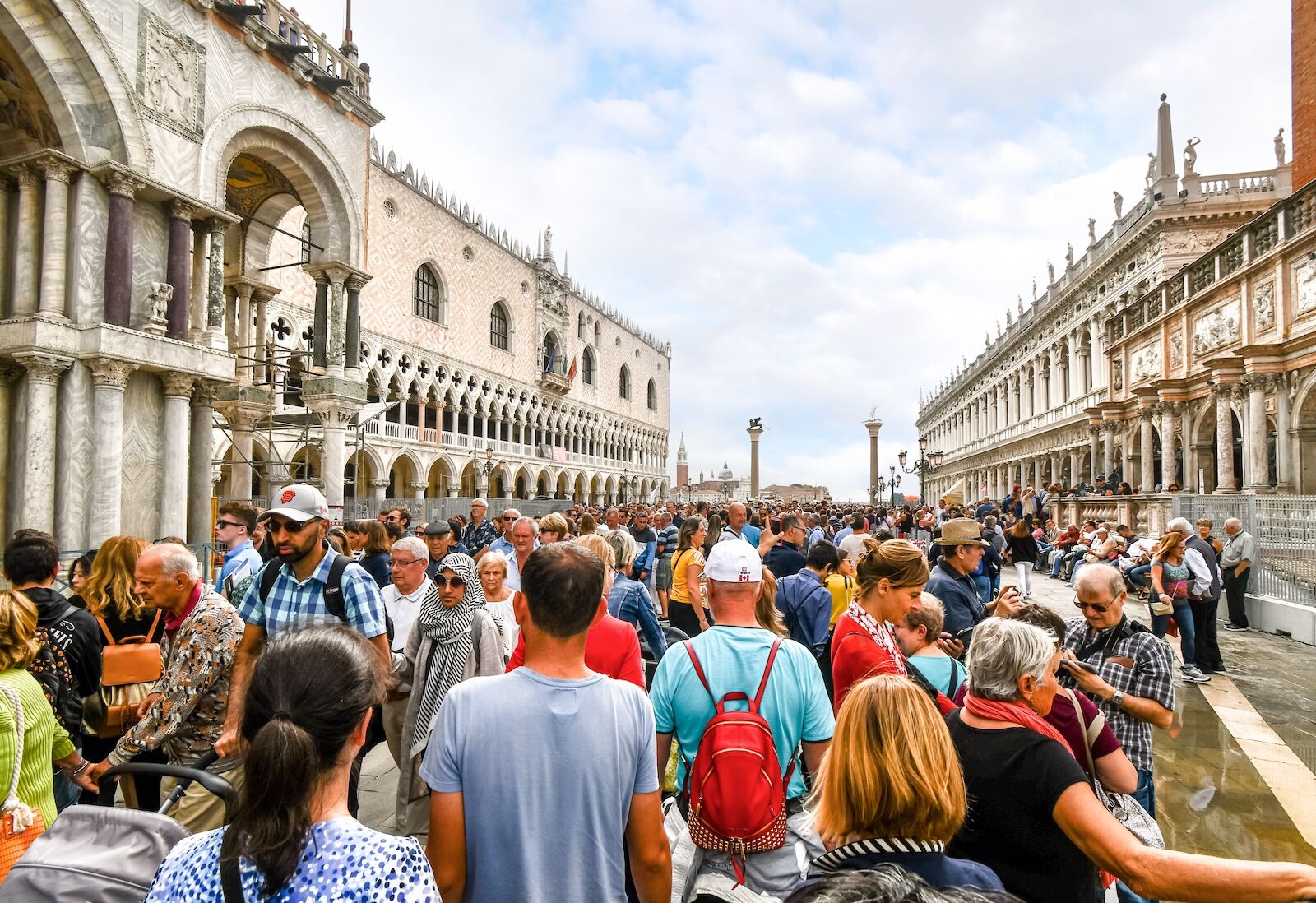Spoiler: if you travel at all, you’re paying a tax because you’re a tourist. When you stay a hotel or resort, you almost certainly pay accommodation taxes, levied on overnight stays in hotels, vacation rentals, or any short-term lodging. It’s separate from resort fees or hotel taxes, and is usually a percentage of the nightly rate. The revenue is often given back to local governments to spend on tourism promotion or sustainability initiatives. And in resort towns where most people are tourists, you may even pay a similar tax at restaurants or for attractions and services.


7 Destinations Charging a Tourist Tax to Fight Overtourism in 2024
But thats not the end of the taxes. Many destinations require permits to visit their most popular attractions. In Palau, if you want to visit famous Jellyfish Lake, you’ll need to buy a $100 permit, and on the extreme end, Rwanda’s Volcanoes National Park charges $1,500 per day for a permit to see the rare mountain gorillas.
But if tourist taxes annoy you, buckle up. In light of rising concerns about overtourism and environmental degradation around the world, many destinations are introducing new taxes — some of which are levied just to entering a town. These are seven destinations that introduced or increased their tourist taxes in 2024 to fight overtourism.
Mount Fuji, Japan

Photo: Sandra Foyt/Shutterstock
Mount Fuji introduced a tourist tax in 2024 for anyone who wants to hike the iconic mountain. The city calls it a “permit,” but since the cap on the number of permits is ridiculously high (4,000 per day), it equates to more of a tax than a tourist limit. Fortunately, it’s inexpensive, with travelers asked to pay the equivalent of about $13 US to access the popular Yoshida Trail. The tax on hiking follows months in which locals built a wall to block a view of Mount Fuji that was causing traffic jams by photographers, and increased enforcement and fines for visitors caught littering or trespassing.
Venice, Italy

Photo: Kirk Fisher/Shutterstock
The impact of overtourism is Venice has been well-publicized, especially since the city is thought to be literally sinking under the weight of tourists. In 2024, the city introduced a five-euro fee for any tourist entering the city on select days. The trial began in April 2024 and is collected by hotels, which add the fee to the guests’ total costs. In July 2024, the city announced that the tourist tax had already netted more than 2 million euros for the city, which plans to spend it on city improvements and programs for residents. Many residents are saying the fee should be raised for 2025, claiming it hasn’t done much to limit tourism.
The fee follows a cruise ship ban enacted on 2021, which barred large cruise ships from docking at the city’s historic port. However, large ships can stick dock nearby Port Maghera and bus tourists in, which is what many of the major European cruise companies are currently doing.
Barcelona, Spain

Photo: Stefano Politi Markovina/Shutterstock
Barcelona, ever-popular with tourists, faces a growing struggle with overtourism. Millions flock to the city each year, with millions of cruise ship guests overwhelming popular areas. This influx strains local resources, drives up housing prices, and disrupts the city’s character. This frustration has occasionally boiled over into protests, with some residents resorting to demonstrations and vandalism targeting tourists.
Barcelona has already responded by implementing regulations on short-term rentals to free up housing for locals, but in 2024, the mayor announced plans to raise the city’s current tourist tax, which was implemented in 2012. Mayor Jaume Collboni said he’s running studies to determine how much to increase the current seven-euro tax on cruise ship day-trippers. The tax is only applied to guests visiting for less than 12 hours, though the city already has a hotel tourist tax that will increase to four euro per night per person, starting in October 2024.
Amsterdam, the Netherlands

Photo: Alfio Finocchiaro/Shutterstock
Amsterdam has long had a problem not just with too many tourists, but with the wrong type of tourists, attracting partiers coming just to explore the vices available in the city’s well-known red light district. The city currently has one of the highest tourist taxes in Europe, but in 2024, that rate went even higher. Now, tourists staying in hotels, resorts, and Airbnbs will need to pay an additional 12.5 percent of the room cost per night, up from the previous rate of seven percent. Cruise ship visitors will also be taxed at 12 percent.
The city has said it wants the fees to limit the number of tourists visiting the city annually, aiming to cap it at 20 million room nights per year with the tax, introduced in 2021. Tax revenue is spent to address the consequences of overtourism and fund initiatives like street cleaning.
Bali, Indonesia

Photo: AsiaTravel/Shutterstock
In 2024, the island of Bali in Indonesia introduced a tourist tax, aimed to cut down on the island’s reputation for crowded roads, rowdy visitors, and cities more welcoming to 20-somethings on yoga vacations than actual locals. In February 2024, the island introduced an international tourist tax of 150,000 Rupiah (about $10). It’s payable upon arrival at the airport, or in advance online on Bali’s tourism website. The government says it’ll be used to pay for tourist infrastructure, but some residents are claiming it’s not being enforced enough.
For now, there’s no penalty for failing to pay the fine — but if you love Bali and its people and landscapes, $10 is a small price to pay to help keep it pristine. You could also split your time between Bali and some of the nearby less-crowded islands.
Iceland

Photo: Roberto La Rosa/Shutterstock
The gorgeous country of Iceland suspended its tourist tax in the years of the COVID-19 pandemic, but reinstated it in January of 2024. Funds go toward sustainability initiatives, as some lawmakers and residents have claimed the country’s growing tourist numbers are taxing its limited environmental resources. Visitors will pay ISK 600 (about $4.50) per night per hotel room, or about $2 for campsite stays. There’s also a fee for cruise ship visitors, which works out to about $7 per day.
Greece

Photo: Pit Stock/Shutterstock
If you’re keen to see the Acropolis or relax on the beaches of Corfu (or, better yet, a lesser-known Greek island), you’ll need to pay a small tourist tax to the country. In January 2024, Greece introduced what it calls a “New Climate Resilience Levy,” with profits used to fund efforts to shield the low-lying country from the impacts of climate change. The fee is paid directly to your hotel and varies based on the cost of your lodging, running from 1.5 to 10 euros per night. For now, the tourist tax is only levied in peak tourist season, from March to October. However, visitors traveling between November and February will still need to pay the “bed tax,” which can run up to four euro per room per night.